game-design
Latest

MMO Mechanics: Encouraging the daily grind
I've written before about how developers use clever mechanics to lower the barrier to entry in order to encourage more people to play MMOs, but how do they keep players interested after they have rolled a new character? More often than not, MMOs greatly benefit from hanging onto players for as long as possible, so encouraging regular play is a massive priority for development teams. As a genre that thrives on creating a connected and dynamic community, MMOs are strengthened by keeping up the number of players that log in daily. This also encourages longevity since players make meaningful connections with the people they are linked to through daily play. Utilising daily quests, creating an ongoing need for crafted equipment, and necessitating the farming of materials for the good of the collective are all very accessible ways to encourage players to log into their favourite MMO world on a regular basis. As useful as developers may find them, though, the appeal of repeatable daily content is hotly debated by MMO players. For some, low-octane daily content is a brilliant way to unwind that doesn't require a regimented schedule to complete, but many others find the repetition inherent in some daily content tiresome and uninspired. In this week's MMO Mechanics, I'm going to look at the various applications of daily content in today's MMOs while weighing up the pros and cons of several of these techniques.

WildStar's Stephan Frost on creating content and keeping within deadlines
Developing an MMO is not an easy process. We know that intellectually, but most of us have not actually built a game ourselves, so we don't know exactly how or why it's not difficult. Design producer Stephan Frost recently penned an article taking a look at the process of design in WildStar, highlighting both common elements to MMO production and some of the ways that Carbine Studios does things a little bit differently. Frost explains that the key to producing an MMO is understanding that it's really more like producing several different games layered on top of one another. He goes on to explain how all content is designed according to a master roadmap, allowing space for individual designers to put their distinct touches on things while still working within an overall vision. If this sort of thing interests you, by all means, take a look at the full article for a deeper look at how these games come to life.
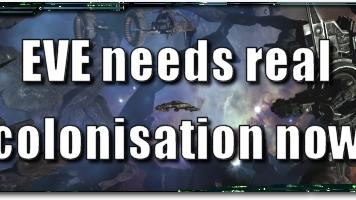
EVE Evolved: EVE needs real colonisation now
MMOs have absolutely exploded in popularity over the past decade, with online gaming growing from a niche hobby to a global market worth billions of dollars each year. Once dominated by subscription games like EverQuest and World of Warcraft, recent years have seen free-to-play games take centre stage. Global MMO subscriptions have been reportedly shrinking since 2010, and EVE doesn't appear to be immune to this industry-wide trend. Though February 2013's figures showed EVE subscriptions have technically grown year-on-year, those numbers were published just after the Chinese server relaunch, and CCP hasn't released any new figures since. Developers have done a good job of catering to current subscribers and polishing existing gameplay with the past few expansions, but the average daily login numbers are still the same as they were over four years ago. EVE will undoubtedly hook in plenty of new and returning subscribers when its deep space colonisation gameplay with player-built stargates and new hidden solar systems is implemented, but time could be running out on these features. Hefty competition is due in the next few years from upcoming sandbox games such as Star Citizen, EverQuest Next, Camelot Unchained, and Elite: Dangerous, and CCP will have to release something big soon to bring in some fresh blood. In this week's EVE Evolved, I ask whether CCP should focus on new players and suggest plans for two relatively simple colonisation-based expansions that could get EVE a significant part of the way toward its five-year goal in just one year.

Epic Games collaborating with university for Epic Games Centre
Epic Games has formed a two-year partnership with Staffordshire University resulting in the Epic Games Centre, a "fully equipped" space for use by students in Staffordshire's game design courses. The agreement provides students "hardware, teaching time and access to software and key personnel" from Epic. The Epic Games Centre will also host Epic Developer Days, an event focused on assisting professional Unreal Engine users. "We have many great courses here at Staffs but this partnership will give our students a deeper understanding of how theory is put into practice and a greater understanding of the commercial complexities of the development process," said Staffordshire's Head of the Games Technology Group Dr. Bobbie Fletcher. Learning how to build games isn't exactly a cakewalk, but students looking to learn the Unreal engine might find it more manageable with an open communications line to its creators. Hopefully Staffordshire students gain unreal knowledge from the partnership and make some epic games to share with the world.
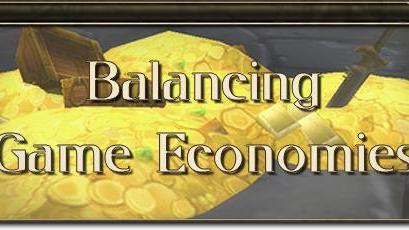
MMO Mechanics: Balancing game economies
Most players won't need an economics degree to play an MMO, but strong mechanical forces under the bonnet still guide our actions in our favourite titles. Virtually every financial exchange can be broken down into an effort equals economic gain equation: We put in our hours, and the game economy churns out new gear or money. Since so many in-game actions financially reward players, MMOs have developed mechanics that attempt to curtail the inflation game economies usually see. Charging your character for goods and services, bind-on-pickup gear, regular destruction of valuable goods, and player-controlled auction house and farming systems all combine to keep the spiralling amount of coppers falling into player hands in check. In this week's MMO Mechanics, I'm going to look at some ways both sandbox and themepark MMOs automatically rebalance weighted economies by exploring the systems that restrict the free trade of goods and curb players' constant accrual of money. I'll look at how each system functions and how player manipulation adds a new layer of realism to game economies.

The Soapbox: The Raid Finder ruined raiding
I don't typically limit myself to ranting about only one game at a time, but I decided to make an exception this week and speak out against World of Warcraft's Raid Finder mechanic. I was running a small and modestly successful raiding guild when this system was introduced, and my team definitely felt the onslaught of this guild-destroying game mechanic first hand. Raid Finder, commonly dubbed LFR by the cool kids in Orgrimmar, is a system that demolishes the competency barrier that stands in the way of freshly level-capped characters and normal raiding content. The system allows players to join a random raiding group in order to tackle a nerfed version of a normal raid and exists mainly to maximise inclusion in the game's best PvE endgame content. LFR was quite popular among casual players that were usually passed up when it came to raiding group formation, but it didn't offer much progress to seasoned raiders. The gear gained had lower stats than its corresponding normal raid counterpart, but the LFR tier simply didn't need the co-ordination required of a group tackling regular raids. A void was created somewhere in between the casual masses who could benefit from the LFR mechanic and the hardcore raiders that simply did not need help with progression. My casual raiding guild was caught in the middle and ultimately met its demise at the hands of LFR, which simultaneously depleted the PUG pool and gave our members another way to see the endgame content they wanted without putting in virtual blood, sweat, and tears.

Brad McQuaid explains more of his design goals for Pantheon: Rise of the Fallen
Pantheon: Rise of the Fallen has only just opened its Kickstarter campaign, and it's about an eighth of the way to its initial goal with more than a month to go. Perhaps you're still on the fence about whether or not you want to donate, however, wondering what sort of game you'll be getting out of it when all is said and done. So why not let the game's creator tell you about it? In the second of a series of community Q&A sessions, Brad McQuaid explains more about the design goals of Pantheon as well as how the game will handle specific mechanics like fast travel, quests, and items. McQuaid also explains what inspired the team to make the game and how far along the development process is at the moment. Check out the full video past the break, and keep your eyes peeled for a third part in the near future.
.png.cf.jpg)
MMO Mechanics: Exploring death mechanics
They say death must come to us all, and that inevitability extends to our characters in MMOs. The death of our characters may be inconvenient when we want to plough through content, but penalising failure is an essential part of any MMO and further incentivises success by making you learn from your mistakes. As much as players crave gratification through rewards and progression, they also need to feel that such progress has been well-earned and greatly deserved. Rewards become that much sweeter when we must risk something to secure them, and failure without consequence would render the gains made in our favourite MMOs insignificant. Without a considerable death penalty, it becomes possible to mindlessly crush content through brute force. I don't know about you, but I don't find fun in bashing my skull repeatedly with a rock in an attempt to crack it! In this week's MMO Mechanics, I compare various death penalties and the effects they have on the MMOs that employ them. I'll explore just how tangible death penalties such as corpse running, gear durability loss, and XP drain make our character's demise feel.
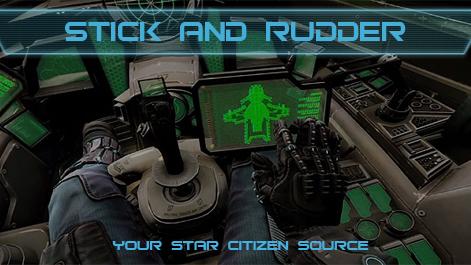
Stick and Rudder: Five reasons Star Citizen isn't a dedicated PvP game
Is it just me, or does a new PvP-vs.-PvE fight break out on the Star Citizen forums every five minutes? In fairness to everyone involved, the jousting we've seen over the past few months is pretty typical of every early adopter MMO community. There's plenty of preening, pseudo-intellectualism, and outright trolling on both sides of the aisle as two player groups make their preferences known early and often in a blatant attempt at influencing game developers to develop something more to their liking. With Star Citizen, though, and with the all-PvP-all-the-time crowd in particular, I'm constantly left wondering whether these people have bothered to research the game they're backing.
.jpg.cf.jpg)
MMO Mechanics: Lowering the barriers to entry
In the increasingly competitive MMO genre, games have to do all they can to keep you as a customer. MMOs have traditionally been quite difficult games to really get into since they typically require a considerable time and money investment and we tend to play them for stretches of several months to years at a time. The gameplay in MMOs is inherently social by nature, forcing you to relate to others, and there are some even more fundamental barriers that get in the way of new players signing up. I'm sure we've all enthused and rambled to our friends in the hope that they might check out our most recent gaming crush, only to see a repulsed look on their faces when they realise it's an MMO. The classic subscription model is a substantial paywall for the average gamer, and this is what has traditionally kept MMOs niche. The early game can be daunting to those who aren't familiar with the genre, and developers pour a lot of effort into easing newcomers into that gameplay. In this week's MMO Mechanics, I'm going to look at how some MMOs manage to break down these barriers through the use of clever mechanics in order to open up MMO gaming to more people than ever before.

MMO Mechanics: Kill 10 rats can be fun!
Quests are increasingly an MMO enthusiast's bread and butter, often becoming the staple component of a game's typical serving of progressive content. Over the years, developers have tried to serve up this familiar progression mechanic in many different ways: The modern themepark MMO makes us fetch, carry, explore, and investigate our way to the endgame through countless quest types and story arcs. Among the varieties of quest on offer, kill quests seem to cause the most tears and tantrums amongst picky players. No matter what developers do, there just isn't much love for missions that send characters off with a shopping list of mundane creatures to crush. Kill quests have become so common that plenty of MMOs have cheekily referenced the "10 rats" trope by literally making us smash in some rodent skulls, but killing cute, twitchy-nosed creatures is not the real problem. It's the uninspired kill list mechanic that often incites complaints of developer laziness, an argument that I don't think is justified. Kill quests exist to hone your skills through repetition, but they don't have to feel like an arduous grinding task and are actually a very useful mechanic for game designers. In this week's MMO Mechanics, I stand up for the unloved stepchild of questing; I'll show you that killing a list of creatures can be both contextually engaging and mechanistically interesting, depending on how it's presented.

EVE Evolved: Designing EVE Onland, part 1
When I'm not playing or writing about EVE Online, I can usually be found huddled over my computer typing lines of code into a compiler and chipping away at bugs that make varying degrees of sense. Designing my own hardcore space game is a really fun challenge and very fulfilling work, but I have a dirty little game dev secret: I've actually always wanted to make a fantasy game. While the budget and personnel required to take on a project the scale of an MMO remain quite far outside my grasp for the moment, it's still fun to think about how I might design such a game if the opportunity arose. The MMO genre seems to be heading for a sandbox revolution this year, and there's no bigger sandbox than EVE Online, but could all of EVE's gameplay translate to a fantasy game? EVE is probably the most atypical MMO out there, maintaining a subscription-based single-shard PvP sandbox in a genre that's typically headed in the exact opposite direction. There are several new sci-fi sandboxes on the way that may or may not qualify as massively multiplayer titles, but the vast majority of MMO gamers still prefer to keep their feet on the ground in fantasy lands. I often find myself wondering how much of EVE Online's core gameplay is possible only because of its setting -- and how much could actually be applied to a fantasy MMO. Not only should it be possible to adapt most of what makes EVE great to a modern land-based game, but many of the mechanics sandbox gamers now attribute almost solely to EVE actually started life in classic fantasy MMOs like Ultima Online. In this week's unusual EVE Evolved, I'd like to start a game design thought experiment as I delve into the hypothetical world of EVE Onland.
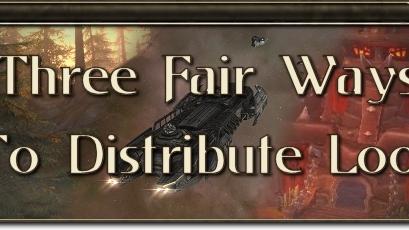
MMO Mechanics: Three fair ways to distribute loot
I mentioned last week that players throw their precious characters into the MMO meat grinder in the pursuit of higher levels, new achievements, or shinier gear. We gladly jump on the seemingly endless PvE treadmill, cranking up the speed with each new patch in an attempt to catch the dangling carrot of character perfection. Of course, we don't just punish ourselves like this to say we overcame some previously impossible challenge; there's shiny new loot to be had! The best booty usually comes from completing group activities like dungeons and raids, but not everyone can agree on how to share the spoils of joint pursuits. Several different loot distribution methods have been devised over the years to solve the problem of fairly distributing the swag, with most methods starting life as player-made agreements that weren't officially supported by hard-coded game mechanics. Players have long since rolled for gear or took turns to claim items round-robin style, leading developers to implement the most popular methods as actual game mechanics to avoid ninja-looting and then the inevitable public pity parties associated with player-led arbitration. In this edition of MMO Mechanics, I'll break down three of the most equitable loot distribution systems used in MMOs today and look at why this age-old problem doesn't have a one-size-fits-all solution.

Some Assembly Required: Yet another FFA PvP sandbox
I dabbled in yet another alpha-state indie sandbox game this week. As you'd expect, the title is rough around the edges. Also as you'd expect, it boasts FFA PvP and the correspondingly godawful community for whom the game's "do whatever you want" mechanics immediately translate to "kill everything that moves first and ask questions later, if at all." Since it's still alpha, there's plenty of time for the devs to correct this unfortunate bit of business and separate this particular game from the legions of crappy FFA-PvP-with-zero-consequences titles clumping together in the vast litterbox of bad MMO ideas. Will they do that? Probably not, but at least I'll get a good rant out of it.

MMO Mechanics: MOBAs vs. MMO battlegrounds
It may feel as if MMOs have always existed as a core part of our gaming repertoire, but the genre made its indelible mark on the industry just over a decade ago. MMO titans like World of Warcraft, EVE Online, and City of Heroes shaped the mechanics we now use as markers and basic standards for the quickly growing genre, and those mechanics have been reiterated and reforged by the countless additions to the MMO clan that we know and love today. This new MMO Mechanics column aims to navigate the mechanical minefield that is the modern MMO through in-depth opinion pieces, comparative analysis, and a little bit of Irish wit, starting with a peek at what distinguishes MMO PvP battlegrounds from Massively Online Battle Arenas. If women are from Venus and men are from Mars, MMOs and MOBAs must be from different galaxies altogether. Despite the similarities between MMO PvP arenas and MOBA matches, the two take very different approaches to progression, persistence, and matchmaking. This leads to two very separate yet equally engaging ways to test the mettle of your character against the might of a human opponent.

The Soapbox: Developers build MMOs backward
How many of you MMOs players have ever maxed out a character's combat level then stood around wondering, "What do I do now?" I would venture to guess that a vast majority of you at one time or another have done that, and I'd also guess that it's been recently. That's because developers have built your game backward. Far too many MMOs rely on the leveling process to be the primary content for the game, and everything after max level appears to be an afterthought tacked on to the game until the developers can come up with new stuff for you to do. I propose that if developers would start building a game's endgame first, we would be looking at a very different kind of game, a more enjoyable game. If a game is intended to be played for months, then developers should spend the most time on the content that players will spend the most time on. It's only logical to me. However, if you ask most developers they will likely tell you that the most expensive or time-consuming part of the game is the leveling process. Why is that?
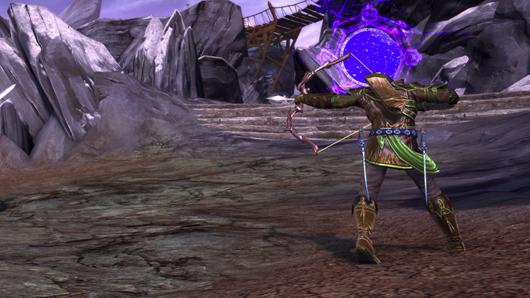
Neverwinter dev blog dives deep into building the Hunter Ranger
Neverwinter's next expansion, Shadowmantle, will bring an all-new class to to game in the form of the Hunter Ranger. The Hunter Ranger will enable players to switch between melee and ranged combat on the fly, and possesses skills designed for mobility and destruction. Cryptic has posted a detailed dev blog about the development of the Hunter Ranger, authored by one of the folks who helped to piece the new class together. The post explains how the team went about building the Hunter Ranger's playstyle by quickly prototyping new abilities and testing them in-game, and walks through the decision-making process that led to the Hunter Ranger being given two full combat styles. Hunter Ranger abilities include Hawkeye, which buffs the Ranger's next attack, Marauder's Rush, which quickly charges and strikes a distant target, Hindering Shot, which roots the target, and Hawk Shot, which deals damage based on the distance from the target. The Hunter Ranger class goes live with Shadowmantle December 5th.

Raph Koster on getting criticism
Veteran developer Raph Koster has authored a blog post that's worth a read if you're a game designer. Heck, it's worth a read if you're a game blogger, game player, or anyone else with aspirations on creative output. The topic is criticism, and more specifically, making the most of it. Koster, best known in MMO circles as one of the minds behind Star Wars Galaxies, Ultima Online, and Metaplace, offers plenty of advice on everything from dealing with people who tell you that you're awesome (these folks are "useless, no, dangerous") to digging for good feedback to the fact that all of your critics are right. "I've never gotten a piece of feedback that was wrong," Koster explains. "You see, you can't deny a player their unique experience. Whatever they felt was true. For them. And something in your work triggered it." He goes on to say that "self-doubt is one of your most powerful tools for craftsmanship." Aside from having "the arrogance to assume anyone will care in the first place," self-doubt is healthy and necessary because creatives are never done learning.

The Soapbox: What's my motivation?
If you play MMOs, odds are good that you're familiar with the classic "kill ten rats" quest trope. Kill quests are one of the most fundamental elements of traditional MMORPG design, and a great deal of modern and classic MMOs would have little to no content without them. Whether it's ten rats, ten wolves, ten bandits, or ten dragons, the basic gist of the quest is always the same: You, the seasoned adventurer, must eliminate animals or enemies for an NPC who for one reason or another cannot handle the task himself. MMOs are built on combat. It's difficult to design a full-featured MMO that engages players for years on end without some sort of PvE killing content; only a handful of MMOs have even attempted it. And while some would say the days of the kill quest are coming to an end, modern MMOs certainly aren't cutting back on killing in general. As a primary mechanic for advancing a character, slaying seems to be the most popular design choice. I don't have a problem with the bulk of my progression coming from throwing fireballs or bashing shields. I don't mind obliterating monsters in multiples of five. What I do mind, however, is being asked to kill without a good reason.

Community Manager Zarhym on game design vs. story development
It's always interesting seeing the blue team's thoughts on World of Warcraft, whether on the community, or the development of the game itself. Community Manager Zarhym had some profound words to share this week regarding the interviews we've been seeing for patch 5.4, and the challenges of setting up community interviews with the different developers. There's been a big, ongoing debate amongst players regarding story development this expansion -- in particular, faction story development. Players feel that the Alliance story has been somewhat left behind this expansion, to say the very least. Zarhym decided to chime in and comment not only on this topic, but on the topic of interviews in general, and how hard the story development team works on the story behind the game we love to play. Given that we've done several interviews with various developers over the course of Mists of Pandaria, it was nice to see Zarhym's thoughts on the matter. Read on for his post in full.






